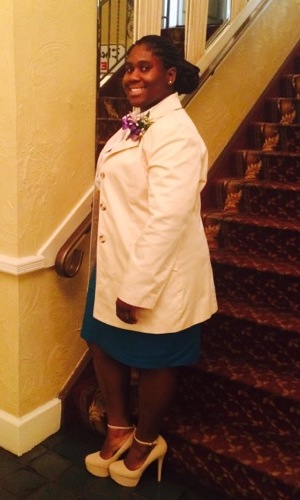Dia Sanders, a full-time employee of a large health care system in North Dakota, is pursuing a dual graduate degree in public health and public policy through the School of Public Health.
Sanders chose the University of Minnesota because it has both a public health program and a policy program with a proven track record of students working hands-on in the field.
After she graduates, Sanders hopes to be a policy specialist, assessing and revising policies that are outdated and no longer properly serve the communities that they were intended to help.
How did you come to decide that online education was the right fit for you?
Interestingly, I have always preferred in-class sessions, with face-to-face interactions with my peers and my professors. However, this summer I had the opportunity to take a core class online. Not only did I enjoy it, but I found I was able to collaborate with a wider variety of students because of our ability to collaborate via multiple technological methods, ranging from phone calls, text messages, video chats, and Google Docs.
What do you enjoy about it most?
I enjoy being able to access my learning on my time. There are deadlines and clear expectations set by our professor, but our time frame for accessing and completing assignments is freeing. I also enjoy being able to work while pursuing my degree. I, like many students seeking advanced degrees, must work while attending classes, and online learning allowed me the best of both worlds.
I was able to meet with my professor multiple times and have WebEx office hours, where she explained class materials, provided advice, and even shared some of her research topics. It allowed me to ask questions to gain better clarity on class assignments while also learning firsthand how I can apply it in the work I do currently.
"I, like many students seeking advanced degrees, must work while attending classes, and online learning allowed me the best of both worlds."
What are some of the unique challenges you face and how do you overcome them?
Initially I tried to just fit my class in when I had free time, however, I soon realized I needed to have a dedicated time and space to work on class assignments. Once I did this, I felt much less stressed, and my understanding of the material began to reflect the study time I dedicated.
How did you become interested in public health and policy?
I have always had a love for health and a deep respect for the work done by health care professionals. As I gained more experience in the field and learned more about social determinants of health and how policies can lead to positive health outcomes … my desire to be the link between the entities of health and policy grew and led to combining the two degrees.
How does your degree tie into your career plans?
Obtaining a public health degree will give me the knowledge base and application skills needed to assess public health issues at various levels and the ability to work with interdisciplinary teams, as well as help community members create solutions that are not imposed on, but are created by and with, the people that will be largely affected by that policy.
What advice would you give to a student considering an online course or degree?
New experiences sometimes come along to challenge us and/or to change us… try a new class or participate in a different format, such as online learning; it can work. And if it doesn’t, that is just fine, too. Use the resources available to you, such as online web chatting with your professor, Google documents to collaborate with classmates on projects, and maybe even start a text chat group to ask questions and share new materials.
